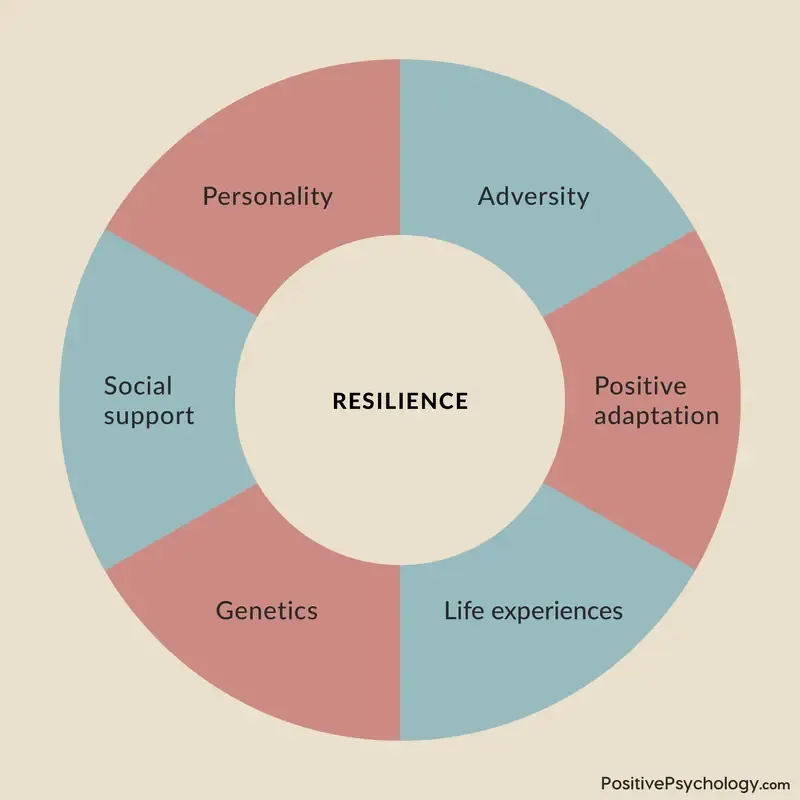
In times of uncertainty and adversity, it is essential to cultivate resilience. Resilience is the ability to bounce back from difficult situations, to adapt and grow amidst change, and to maintain a positive outlook. Building resilience is crucial for navigating the challenges that life throws our way.
The 7 Cs of resilience provide a framework for developing inner strength and fortitude. These Cs are confidence, contribution, control, change, coping, competence, connection, and commitment. Each of these Cs plays a vital role in building resilience and can be cultivated through intentional practice.
Confidence is about believing in oneself and one’s abilities. It is the foundation of resilience, giving us the courage to face challenges head-on and persevere in the face of adversity. Developing self-confidence involves recognizing our strengths and accomplishments, embracing failure as an opportunity for growth, and cultivating a positive self-image.
Contribution refers to the act of giving back and making a positive impact on others. When we contribute to our communities and help those in need, we not only create a sense of purpose and fulfillment but also strengthen our resilience. By focusing on the needs of others, we gain perspective and develop empathy, which can help us navigate our own challenges with greater resilience.
Control is about recognizing and accepting what we can and cannot control. It is essential to focus our energy on the things we can influence, such as our attitudes, actions, and responses to adversity. By letting go of the need to control everything and embracing uncertainty, we can cultivate resilience and adaptability in the face of change.
Change is inevitable in life, and building resilience requires embracing and adapting to it. Instead of fearing change, we can view it as an opportunity for growth and self-discovery. By developing a mindset that welcomes change and sees it as a chance for new beginnings, we can navigate uncertain times with greater resilience.
Coping refers to the strategies and techniques we use to manage stress and maintain our well-being. Building resilience involves developing healthy coping mechanisms, such as exercise, mindfulness, and seeking support from others. By prioritizing self-care and finding effective ways to cope with stress, we can build resilience and thrive in challenging times.
Competence is about developing and honing our skills and abilities. When we feel competent in various areas of our lives, we have greater confidence in our ability to overcome challenges. Building resilience involves continuously learning and growing, seeking new experiences, and embracing opportunities for personal and professional development.
Connection refers to the relationships and social support networks we have in our lives. Building resilience involves cultivating meaningful connections with others, fostering a sense of belonging and support. By nurturing our relationships and seeking support from others, we can build resilience and weather life’s storms more effectively.
Commitment is about staying dedicated to our goals and values, even in the face of adversity. Building resilience requires a commitment to personal growth, perseverance, and the belief that we can overcome challenges. By staying committed to our values and aspirations, we can build resilience and find meaning and purpose in difficult times.
By incorporating the 7 Cs of resilience into our lives, we can build inner strength and navigate challenging times with grace and resilience. Cultivating confidence, contribution, control, change, coping, competence, connection, and commitment can help us bounce back from setbacks, adapt to change, and thrive amidst adversity.
Commitment to Growth
Commitment to growth is a key factor in building resilience. It involves having the confidence and willingness to embrace change and continually work on developing oneself.
When faced with challenges, individuals with a strong commitment to growth are able to adapt and adjust their mindset to see these challenges as opportunities for learning and personal development.
Character plays a significant role in commitment to growth. It is about having the determination and perseverance to overcome obstacles and stay committed to one’s goals and values.
Connection with others is also important in building resilience. Having supportive relationships and a strong network of friends and family can provide encouragement and motivation to continue growing and developing.
Competence is another aspect of commitment to growth. Developing and honing skills and knowledge in various areas can increase an individual’s confidence and ability to navigate through challenging situations.
Control is an important factor in commitment to growth. Recognizing that there are certain things within one’s control and taking responsibility for those aspects can empower individuals to take action and make positive changes.
Lastly, commitment to growth involves a sense of contribution. It is about recognizing that one’s growth and development can have a positive impact on others and the world around them. By striving to make a meaningful contribution, individuals can find purpose and fulfillment in their journey of growth.
In summary, commitment to growth is essential for building resilience. It involves having the confidence, willingness, and determination to embrace change, develop one’s character, foster connections, build competence, take control, and make a positive contribution to oneself and others.
Embracing Change

Change is an inevitable part of life, and developing resilience means learning to embrace and adapt to it. In challenging times, it is crucial to cultivate the competence and character necessary to navigate change with confidence.
Building resilience involves developing the skills and abilities needed to cope with change effectively. This includes building a strong sense of self-confidence and belief in one’s abilities to overcome obstacles. By recognizing and utilizing personal strengths, individuals can develop the resilience needed to face and navigate change.
Embracing change also involves making a commitment to personal growth and development. This commitment requires individuals to take proactive steps towards building resilience, such as seeking out opportunities for learning and growth, and actively working to improve coping strategies.
Connection and contribution are also key aspects of embracing change. By fostering connections with others and contributing to the well-being of others, individuals can find support and strength in times of change. Building strong relationships and networks can provide a sense of belonging and support, which can help individuals navigate change more effectively.
Ultimately, embracing change requires a mindset that sees change as an opportunity for growth and learning. By reframing change as a chance to develop resilience and build inner strength, individuals can approach challenging times with a positive and proactive attitude.
| Key Points |
|---|
| – Embrace change and adapt to it |
| – Cultivate competence and character |
| – Build confidence and belief in your abilities |
| – Make a commitment to personal growth |
| – Foster connections and contribute to others |
| – See change as an opportunity for growth |
Learning from Setbacks

Setbacks are an inevitable part of life. They can come in many forms, such as a failed project, a lost opportunity, or a personal disappointment. While setbacks may be challenging and disheartening, they also offer valuable opportunities for growth and learning.
When faced with a setback, it is important to recognize the connection between resilience and change. Resilient individuals understand that setbacks are not permanent and that change is a natural part of life. They embrace change as an opportunity for growth and adaptation.
Confidence is another key factor in learning from setbacks. Resilient individuals have confidence in their ability to overcome challenges and bounce back from setbacks. They believe in their own abilities and have a positive attitude towards their own competence.
Control plays a crucial role in learning from setbacks. Resilient individuals focus on what they can control in a given situation, rather than dwelling on what they cannot control. They take proactive steps to regain control over their circumstances and make the necessary changes to move forward.
Competence is also important in learning from setbacks. Resilient individuals recognize that setbacks provide an opportunity to develop new skills and knowledge. They view setbacks as a chance to improve their competence and become better equipped to handle future challenges.
Contribution is another aspect of learning from setbacks. Resilient individuals understand that setbacks are not only about their own personal growth, but also about how they can contribute to others. They seek ways to use their setbacks as a platform for helping others and making a positive impact.
Character is a fundamental element in learning from setbacks. Resilient individuals demonstrate strength of character by remaining true to their values and beliefs, even in the face of adversity. They use setbacks as an opportunity to reflect on their character and make adjustments if necessary.
Coping strategies are essential in learning from setbacks. Resilient individuals develop healthy coping mechanisms to deal with the stress and emotions that come with setbacks. They engage in self-care activities, seek support from others, and practice resilience-building techniques to navigate through challenging times.
In conclusion, setbacks can be valuable learning experiences if approached with the right mindset. By recognizing the connection between resilience and change, having confidence, focusing on what can be controlled, developing competence, seeking ways to contribute, demonstrating strength of character, and using effective coping strategies, individuals can learn and grow from setbacks, ultimately building inner strength in challenging times.
Confidence in Abilities

Confidence in abilities is a crucial component of building resilience in challenging times. It involves having a strong belief in one’s own contribution and competence. When faced with adversity, individuals with confidence in their abilities are more likely to demonstrate commitment and control over their circumstances.
Confidence is closely tied to character, as it reflects a person’s belief in their own values and strengths. It allows individuals to navigate change and adapt to new situations with a sense of self-assuredness. Developing confidence in abilities requires coping with and overcoming obstacles, which in turn builds resilience.
Building confidence in abilities involves recognizing and celebrating achievements, no matter how small. It also involves setting realistic goals and taking steps towards achieving them. By acknowledging one’s own competence and focusing on personal growth, individuals can cultivate a strong sense of confidence.
Confidence in abilities is not about being perfect or having all the answers. It is about being willing to take risks, learn from failures, and continue to grow. It is about trusting oneself and having faith in one’s own abilities to overcome challenges and achieve success.
In conclusion, confidence in abilities is a vital aspect of resilience building. It allows individuals to navigate change, cope with adversity, and adapt to new circumstances. By developing confidence in their own contribution, commitment, control, character, and competence, individuals can build inner strength and thrive in challenging times.
Developing Self-Efficacy
Self-efficacy refers to an individual’s belief in their ability to successfully accomplish tasks and overcome challenges. Developing self-efficacy is an essential component of building resilience. When faced with change and adversity, having confidence in one’s competence and abilities can provide the necessary motivation and determination to persevere.
Building self-efficacy involves several key factors. First, it is important to recognize and develop one’s competence. This involves identifying and building upon strengths and skills, as well as seeking out opportunities for growth and learning. By continually expanding our knowledge and abilities, we can increase our confidence in our ability to handle different situations.
Connection and support from others also play a crucial role in developing self-efficacy. Surrounding ourselves with positive and encouraging individuals can provide the emotional support and guidance needed to navigate challenges. Additionally, seeking out mentors or role models who have successfully overcome similar obstacles can help inspire and motivate us to believe in our own capabilities.
Contributing to others and making a positive impact can also boost self-efficacy. By actively engaging in acts of kindness and helping others, we not only contribute to the well-being of others but also reinforce our own sense of competence and ability to make a difference.
Control and commitment are two additional factors in developing self-efficacy. It is important to recognize that we have control over our thoughts, actions, and responses to challenges. By focusing on what we can control and committing to taking proactive steps towards our goals, we can build a sense of empowerment and confidence in our ability to navigate difficult situations.
Coping strategies are also essential in developing self-efficacy. Learning and practicing healthy coping mechanisms, such as problem-solving, stress management, and self-care, can enhance our ability to handle adversity and bounce back from setbacks.
In summary, developing self-efficacy is a crucial aspect of building resilience. By recognizing and developing our competence, seeking support from others, contributing to the well-being of others, embracing control and commitment, and utilizing effective coping strategies, we can strengthen our belief in our ability to overcome challenges and thrive in the face of adversity.
Building a Supportive Network

Confidence is bolstered when individuals have a network of people who believe in their abilities and provide encouragement. Connection is fostered through meaningful relationships with others who can offer empathy and understanding. Competence can be developed by learning from the expertise and experiences of others in the network.
Commitment to resilience is strengthened when individuals have a network of like-minded individuals who share similar goals and values. Character is shaped through interactions with others who demonstrate integrity, honesty, and resilience themselves. Contribution is encouraged within a supportive network, as individuals can offer their skills and resources to help others in need.
Coping skills can be enhanced through the support and guidance of a network, as individuals can learn and practice effective strategies for managing stress and adversity. Lastly, having a supportive network provides individuals with a sense of control, as they can rely on others for assistance and collaboration in finding solutions to challenges.
Overall, building a supportive network is crucial for fostering resilience and building inner strength in challenging times. By surrounding oneself with people who provide support, encouragement, and resources, individuals can better navigate through difficult situations and emerge stronger on the other side.
Control over Emotions
In challenging times, it is important to have control over our emotions. Emotions such as fear, anxiety, and stress can easily overwhelm us and hinder our ability to cope effectively. However, by developing control over our emotions, we can better navigate through difficult situations and build resilience.
Control over emotions involves a commitment to managing our emotional responses and developing coping strategies. It requires recognizing and acknowledging our emotions, understanding their triggers, and finding healthy ways to express and process them.
Building competence in emotional regulation is essential for gaining control over emotions. This involves developing skills such as self-awareness, self-regulation, and empathy. By understanding our own emotions and the emotions of others, we can better manage our reactions and make more informed decisions.
Control over emotions also requires embracing change and adapting to new circumstances. It involves recognizing that we cannot control everything that happens to us, but we can control how we respond. By accepting change and being open to new possibilities, we can better navigate through challenging times.
Furthermore, control over emotions involves making a positive contribution to our own well-being and the well-being of others. By focusing on acts of kindness, gratitude, and compassion, we can cultivate a sense of purpose and fulfillment. This can help us maintain a positive outlook and better manage our emotions.
Finally, control over emotions is closely tied to our character and confidence. By building resilience, we can develop a strong sense of self and belief in our ability to overcome challenges. This confidence empowers us to take control of our emotions and navigate through difficult times with strength and determination.
| Key Points |
|---|
| 1. Control over emotions involves a commitment to managing our emotional responses and developing coping strategies. |
| 2. Building competence in emotional regulation is essential for gaining control over emotions. |
| 3. Control over emotions requires embracing change and adapting to new circumstances. |
| 4. Making a positive contribution to our own well-being and the well-being of others is important for control over emotions. |
| 5. Control over emotions is closely tied to our character and confidence. |

I am Patrina de Silva, a psychologist and mental health blogger in Sri Lanka. After obtaining psychology degrees from the University of Colombo and Monash University, I returned home to work as a counselor while also starting the popular blog “Pressy but Happy” to provide advice on psychological issues. Over the past decade, my empathetic articles have made my blog a leading mental health resource in the country. In addition to writing, I maintain a private therapy practice, frequently volunteer counseling time, and conduct seminars, driven by my passion for destigmatizing mental illness and educating the public on the mind-body connection. I strive to be an influential voice in my field through my compassionate approach.
